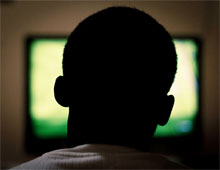[intro]This column is part of Tim Knight’s series of Master Classes on the craft of Broadcast Journalism for The Journalist. Knight works out of Cape Town and for ten years was head of TV journalism training at the Canadian Broadcasting Corporation (CBC)[/intro]
It goes like this. You’re very young. You’re playing in mud puddles and paint pots all day. Comes the end of the day, a parent hauls you, protesting loudly, out of the mud puddles and paint pots. You’re stripped and bathed, scrubbed and powdered, wrestled into pyjamas and tucked into bed.
You’re at the most impressionable time in all your life. Apart from learning to play in mud puddles and paint pots, your only real need and purpose in life is to learn. So you can survive. Nothing else is important. (This assignment lasts until puberty when some more sophisticated but no less urgent needs take priority.)
You’re learning frantically. Every day. In fact, some experts believe that by the time you’re seven years old you’ve learned about half of everything you’re ever going to know. Extraordinary!
You’re in bed. It’s time for stories. Bedtime stories.
Parents generally deliver two types of bedtime stories.
- Stories composed on the spot.
- Stories read from a book.
My entirely unscientific research tells me that almost always the stories are delivered in exactly that order.
First, the made-up story. How your father, the handsome prince met your mother, the beautiful princess. How they loved each other. Then one day you were born.
Exciting, fascinating, intriguing, sparkling stuff. Keeps you awake. Entranced. Engrossed.
Then the parent reaches for the book. And starts to read to you. Droning along with the very best reading voice. Full of artificial enthusiasm. No involvement. No real participation — factual or emotional —in the meaning of the words.
The information is, no doubt, very important. It may even be survival information. After all, you — like every other little kid — surely need to know about Goldilocks and her strange relationship with three bears.
But after a while the artificial enthusiasm, the droning voice, the lack of involvement and participation, all get to you. Your head nods. Eyes start closing. Either the parent-reader or you — or both — fall asleep.
Which, whether deliberate or not, is actually what your parents wanted to happen when they read to you at bedtime.
What this means is that enormous numbers of kids learn a very important lesson at their most impressionable age. At precisely the time when they’re most vulnerable to such lessons.
They learn that they will please a powerful and important person if — when read to — they fall asleep.
I believe this becomes imprinted in many of us. So that now, all grown up, we’re conditioned to fall asleep when read to by powerful and important people. Particularly, powerful and important people like anchors and reporters on TV.
We’ve been imprinted and processed. We’ve learned how to please. Like Pavlov’s dogs.
It doesn’t have to happen that way.
We watch TV alone.
Even when we watch TV with friends and loved ones, we watch TV alone.
Even when we watch TV entwined in bed with a loved one we watch TV alone.
Each of us in the TV audience sees, hears and retains different things.
TV is hugely different from movies and theatre.
A movie is a special event. You leave home to go to it. Line up. Pay money. It’s dark. Movie houses have enormous screens, increasingly monstrous sound. The movie tries to get us all laughing at the same time, crying at the same time, scared at the same time.
The movie wants to unite us.
The theatre is much the same as a movie except that it’s an even more special event (to say nothing of more expensive). It’s dark. Theatres, like movies, have enormous screens (with smaller actors). The theatre tries to get us all laughing, crying, scared at the same time.
The theatre wants to unite us.
But TV is watched in homes. Your home. My home.
TV is not a special event.
- Lights stay on.
- The screen is tiny. It takes up some 15% of the viewer’s visual field compared to the movie’s 70%.
- The sound is puny.
- Telephones ring.
- Food is cooked.
- People talk.
- Children whine.
- Bathrooms and refrigerators are visited.
- Significant others need that significance recognised and confirmed.
So TV doesn’t unite all its millions of viewers. It can’t. There’s no way it can unite the people who watch the same TV programme at the same time.
But what it can do — and do marvellously well — is unite just two of us.
No, not the couple entwined in the bed. They can do their own uniting.
TV can unite the broadcaster and the viewer.
That’s the art of it. It’s not hard to do. It just takes a whole lot of re-thinking, re-viewing, re-vising.
Consider, for instance, this thought:
Almost everything that works well when two people talk to each other off-screen works just as well on-screen.
Let’s explore that thought
So why don’t we journalists behave like real, normal people when we go on TV?
A few of us do, of course.
But most of us just drone on endlessly. Without thought. Without involvement. Without natural pauses to help the viewer comprehend, consider and retain the information.
Next week, some answers.
(I’d love to know whether any journalism schools are discussing my craft columns with their students. If so, what are their reactions? And are there any subjects you’d like to suggest?)
It’s the eleventh instalment in Knight’s Master Classes for The Journalist on the craft of broadcast journalism. Earlier columns were The Business of Social Journalism, How to Interview (parts 1 and 2), The Unknown SABC Story (parts 1, 2 and 3), Storytelling Is Magic, Screw The Inverted Pyramid and The Curse of the MAMCWWM, Write Like You Speak and Expose Yourself on TV (parts 1, 2 and 3).
Next week in this series, Knight explains how even journalists can behave like normal people onTV.











The info is amazingly unique. [url=https://www.mulgogimusic.com/bbs/board.php?bo_table=free&wr_id=2198786]Realiza una compra en línea de nasobec sin receta[/url]
pharmacie en ligne france pas cher https://kamagraenligne.com/# pharmacie en ligne sans ordonnance
Achat mГ©dicament en ligne fiable: achat kamagra – Pharmacie Internationale en ligne
amoxicillin online purchase: amoxil online – amoxicillin 500mg capsule cost
generic for amoxicillin
https://azithromycinca.shop/# doxycycline online india
doxycycline 100mg without prescription
mexican rx online [url=https://northern-doctors.org/#]mexican northern doctors[/url] mexican rx online
mexico drug stores pharmacies [url=http://northern-doctors.org/#]northern doctors pharmacy[/url] buying from online mexican pharmacy
best online pharmacies in mexico [url=http://northern-doctors.org/#]mexican pharmacy northern doctors[/url] medicine in mexico pharmacies
best online pharmacies in mexico [url=https://northern-doctors.org/#]northern doctors pharmacy[/url] medication from mexico pharmacy
buying prescription drugs in mexico online: northern doctors pharmacy – reputable mexican pharmacies online
medication from mexico pharmacy [url=https://northern-doctors.org/#]northern doctors[/url] mexican pharmaceuticals online
purple pharmacy mexico price list [url=http://northern-doctors.org/#]Mexico pharmacy that ship to usa[/url] mexican online pharmacies prescription drugs
https://northern-doctors.org/# mexico pharmacies prescription drugs
reputable mexican pharmacies online: mexican pharmacy – mexican border pharmacies shipping to usa
mexican pharmacy: Mexico pharmacy that ship to usa – buying prescription drugs in mexico
reputable mexican pharmacies online [url=https://northern-doctors.org/#]northern doctors[/url] mexican border pharmacies shipping to usa
https://northern-doctors.org/# medicine in mexico pharmacies
http://northern-doctors.org/# buying prescription drugs in mexico
mexican pharmaceuticals online [url=http://northern-doctors.org/#]mexico drug stores pharmacies[/url] purple pharmacy mexico price list
mexican border pharmacies shipping to usa: Mexico pharmacy that ship to usa – reputable mexican pharmacies online
Online medicine home delivery: best india pharmacy – cheapest online pharmacy india
mexican mail order pharmacies: mexican online pharmacies prescription drugs – medicine in mexico pharmacies
doxycycline discount: doxycycline best price – doxycycline 100 mg pill